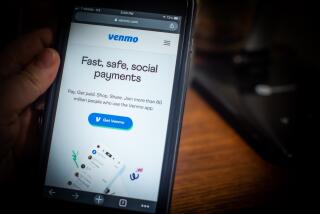Managing Money : Secured Cards Aren’t Limited to Credit Risks
- Share via
Consumers looking for lower credit card rates and fees are increasingly considering secured cards. But this form of plastic may not necessarily be the best deal for you.
Secured cards, unlike the more common unsecured variety, can be obtained by placing money in a savings deposit that can be tapped if you miss payments. These cards traditionally have been offered to people with severe credit problems or no credit histories--and often charge exorbitant interest rates or fees.
But now, secured Visas or MasterCards are being tailored to borrowers with strong credit histories. The best deals--including several at smaller California savings and loans--require no annual fees, have annual interest charges as low as 7% and pay market rates on deposits used as collateral.
These low-rate, secured cards also have another appeal: Under tax reform, interest on credit card and other non-mortgage borrowings is only 40% deductible this year and will no longer be deductible by 1991.
“In California, secured cards can be an excellent deal for consumers,” says Ken McEldowney, executive director of Consumer Action, a San Francisco-based organization that tracks credit card rates statewide.
About 10 savings institutions offer secured cards in California, McEldowney says. All pay regular interest on passbook accounts, certificates of deposit or money market deposit accounts. Six of the 10 have no annual fee.
Those six--primarily based in Northern California--are Continental Savings of America, Great American First Savings Bank, Heart Federal Savings, Northbay Savings, Pacific Coast Savings and Time Savings, McEldowney says.
Among the more attractive deals is one offered by Time Savings, based in San Francisco. Its secured Visa card, offered nationally, charges no annual fee and a 7.5% annual interest rate (far below the 18%-plus national average) for accounts secured by a savings account that currently pays 5.5%. The interest rate is 12.5% for accounts secured by CDs currently paying between 7% and 8%.
The card requires a $1,000 minimum deposit, with approved applicants receiving a credit line equal to half the deposit. For those who like to pay off their balances quickly, Time offers a 30-day grace period.
So far, such deals have primarily been offered by smaller institutions. But the response from consumers is spurring other, bigger institutions to enter the fray. For example, State Street Bank & Trust in Boston, one of the nation’s largest and most respected credit card issuers, recently unveiled a secured credit card program for consumers with good credit.
“The idea of getting a better loan rate based on a secured deposit is going to be the next big thing,” says David Robertson, vice president at the Nilson Report, a credit card newsletter in Santa Monica. Savings institutions, he says, increasingly will tout low-rate secured cards as a marketing tool to lure consumers’ deposits and other business.
Recent college graduates, divorced spouses and others who are just starting out on their own with no credit histories occasionally are accepted for these low-rate deals.
Unfortunately, however, these cards are hard to get if you have current credit troubles. Credit-tainted borrowers often must settle for secured cards with high rates and fees. But if you can establish a good payment record with the card, some institutions allow you to switch to unsecured cards after a year or so, Robertson says.
“Secured cards are an ideal way to establish a positive credit history,” says Elgie Holstein, executive director of the Bankcard Holders of America, a Washington-based consumer group. “For folks who don’t have an alternative, this can be an excellent way to get back on the road.”
However, even if you have no credit problems, secured cards aren’t necessarily ideal for you.
That may be true if you want a large credit line. Secured cards may require you to tie up too much money in the deposit, Holstein argues. For each $1 in your credit line, you may have to deposit at least $1.50 or $2--money that cannot be withdrawn as long as you hold the card and have an unpaid credit balance. That deposit money, Holstein suggests, might be better used to pay down your current credit card debts, particularly if you are paying a high rate.
“The quickest way to earn 20% on your money is to pay off debts on which you are paying 20%,” Holstein says.
If you’re interested in getting the highest returns on your savings, secured cards also may be a bust. Institutions offering secured plastic usually don’t pay the highest rates on deposits tied to the accounts--and a handful don’t pay any interest at all. Thus, Holstein argues, you might be better off getting an unsecured card and putting your deposits in accounts paying higher rates.
“Your decision should be dictated by the rate you will be getting on your deposit,” Holstein says.
And if you’re the type who usually pays off your credit balances immediately--and thus incurs no interest charges--you might do better getting an unsecured card with no annual fee.
In addition, when shopping for a secured card--particularly if you have credit troubles--be wary of fraudulent and shady deals. Many questionable schemes are offered by so-called “credit repair clinics” that advertise in classified ad sections of newspapers, Holstein says.
They promise to get you credit regardless of your credit history, but any credit card you get may come as part of a package of credit counseling services that may cost you hundreds of dollars, he says. And the application fee for such services may be non-refundable, even if your application for a card is rejected.
The Nilson Report says less creditworthy Americans cough up $50 million annually on unnecessary application and processing fees to get secured cards.
Another caution: If you are trying to use your secured card to restore a strong credit history, make sure the card’s issuer reports to credit bureaus so your payment record can be used as a reference by other lenders. Some issuers of secured plastic don’t report to credit bureaus.
How to start shopping around? A list of secured credit cards offered nationwide can be obtained by sending a $3 check to Bankcard Holders of America, 460 Spring Park Place, Suite 1000, Herndon, Va. 22070. For an additional $1.50 each, the organization will send you its list of no-fee cards or list of low-rate cards.
A list of secured cards, as well as other cards, offered by California issuers can be obtained free by sending a self-addressed, business-size envelope with 45 cents postage to Consumer Action, 693 Mission St., San Francisco, Calif. 94105.
Bill Sing welcomes readers’ comments but regrets that he cannot respond individually to most letters. Write to Bill Sing, Personal Finance, Los Angeles Times, Times Mirror Square, Los Angeles, Calif. 90053.
More to Read
Inside the business of entertainment
The Wide Shot brings you news, analysis and insights on everything from streaming wars to production — and what it all means for the future.
You may occasionally receive promotional content from the Los Angeles Times.










